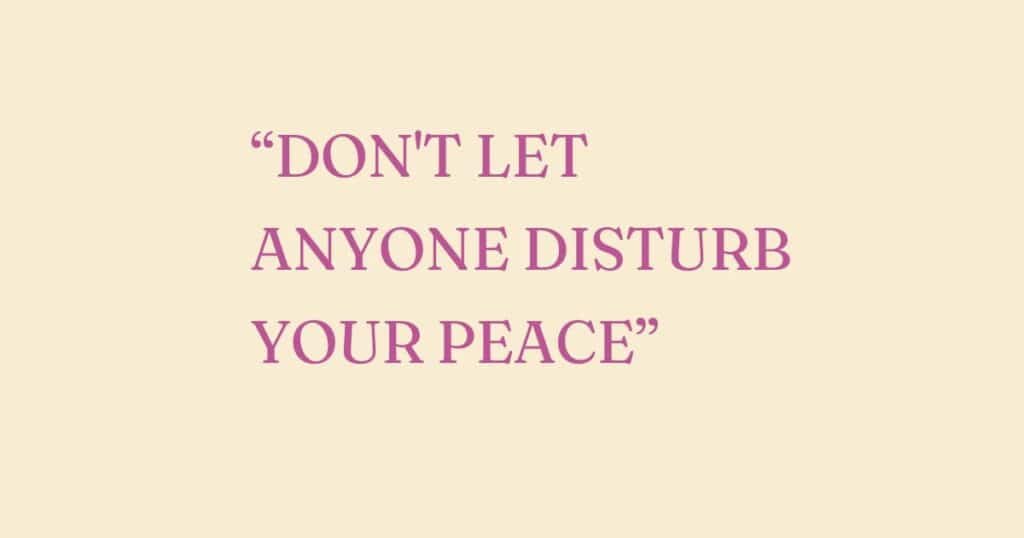People often ignore their inner peace in their pursuit of prosperity and happiness. Don’t let anyone disturb your peace. Staying calm in life’s storms has never been more critical.
This article guides you to embrace serenity and ensure that nobody disrupts your peace.
Here are key practices to maintain serenity and perseverance:
- Set Boundaries – Say “no” without guilt and avoid toxic influences.
- Prioritize Self-Care – Engage in activities that nourish your mind and body.
- Control Your Mindset – Practice gratitude, avoid comparison, and focus on growth.
- Limit Disruptions – Reduce digital noise and cultivate a positive environment.
- Seek Support – Therapy can help process emotions and heal past wounds.
Let’s make these practices a part of daily life and understand why inner peace matters.
Why Is Inner Peace Important?

Inner peace is a state of mental and emotional calmness, free from the turmoil of negative thoughts and feelings.
Before we discuss how to protect your inner serenity, let’s first understand why it’s so crucial.
Peace promotes calm and tranquility
When we cultivate stillness within ourselves, we create a foundation that helps us stay grounded amidst the ups and downs of life. It is during these moments that we can recharge and reconnect with ourselves.
We let go of stress and anxiety, substituting them with a profound serenity. We create a space where our minds can rest, and our souls can find solace.
Peace enhances mental clarity and focus

Peace is not just a state of tranquility; it also enhances mental clarity and focus.
When our minds are free from disturbances and distractions, we are better equipped to concentrate on the task.
We can think, make wise decisions, and increase productivity.
Peace contributes to overall happiness and well-being
When we are at ease, our minds are free from the constant chatter and distractions that often consume our thoughts.
Pay attention to the present to increase mindfulness and awareness.
With a restful mind, we build healthier relationships and pursue our goals with purpose and fulfillment.
Factors that can disturb your harmony
Negative and toxic people

Harmful and toxic people can have a significant impact on our overall harmony and well-being.
These individuals are prone to pessimism, constantly complaining and finding faults.
They may continuously criticize, belittle, and gossip, manipulating and controlling others while always pursuing their desires.
Socializing with such people drains us emotionally and lowers our self-esteem.
Their negative energy can seep into our lives, affecting our mood, productivity, and relationships.
As the Dalai Lama wisely said,
“Do not let the behavior of others destroy your inner peace.”
Safeguard your inner world—it’s your treasure.
Don’t let anyone disturb your peace.
Stressful environments and situations
The stress of a bustling office or the pressures of personal commitments might overwhelm us.
In difficult times, we must be silent despite external forces.
Taking the time to engage in activities that bring us joy and relaxation can help restore balance and reduce stress levels.
Internal conflicts and negative self-talk

Internal conflicts and self-criticism might disrupt our inner serenity.
We often fight self-doubt, criticism, and negative thoughts in our brains.
This mental debate might relentlessly challenge our abilities, worth, and judgments.
Overthinking and rumination make this worse, pulling us into endless cycles of worry and regret that disturb your peace.
Remember that negative self-talk is useless and only destroys our contentment.
Internal tension often originates from comparing ourselves to others.
We see and read about successful people, making us feel insufficient and undeserving.
This comparison trap reinforces self-pity and emotions of inferiority.
Everyone’s route is different.
Fear of judgment, whether from others or ourselves, deepens the struggle.
It makes us overly cautious and self-conscious.
We become hesitant to take risks or express ourselves freely.
Focus on progress, embracing even small successes rather than comparing yourself to others.
Cultivate self-compassion and embrace imperfections.
Treat yourselves with kindness.
Readers also check out:
When and Why Sometimes you have to remove yourself: Strategic Self-Removal
I can’t be alone with my thoughts: Overcoming challenges and finding comfort
Unresolved Past Traumas
Unresolved past traumas often disturb your peace, lingering beneath daily life.
These emotional wounds—from childhood, relationships, or major life events—don’t simply fade with time.
Left unaddressed, they create patterns that disrupt your sense of balance.
Trauma responses show up in unexpected ways.
You might overreact to small triggers, experience unexplained physical symptoms, or repeat harmful relationship patterns.
These aren’t personal flaws but your nervous system’s way of protecting you from past pain.
The body holds onto these experiences.
Traumatic memories bypass logic.
They arise from a survival instinct, not rational thought.
This is why reasoning alone rarely stops fear-based reactions.
The effort to bury trauma drains your energy, leaving you anxious, disconnected, and unable to fully enjoy the present.
Social Media and Information Overload

Social media and nonstop news can disrupt inner peace.
Scrolling through highlight reels of others’ lives can spark comparison, self-doubt, and FOMO (fear of missing out).
Each notification triggers dopamine, keeping us glued to our screens and craving the next update.
Our brains aren’t built to process the constant flood of news, messages, and updates.
This digital noise drains focus, adds stress, and drowns out moments for reflection.
This can raise anxiety, cause depression, and lower self-esteem.
Negative news cycles add another layer of distress.
Algorithms prefer engagement over well-being, showing us divisive and emotional content.
Media outlets push alarming stories because fear drives engagement.
Our brains evolved to detect threats, so bad news grabs our attention.
This “negativity bias” distorts reality, making the world seem more dangerous than it is.
Doom-scrolling—mindlessly traps us in a cycle.
The Art of Maintaining Peace
Learning what to do when someone disturbs your peace helps you maintain inner harmony.
Identifying Disturbances
These disruptions, whether internal or external, must first be identified to be addressed.
Determining when we have control over a disturbance is significant. It’s tempting to change everything, yet this might cause discontent and despair.
Instead, reflecting on change helps us channel energy.
By actively noticing disruptions in our lives and taking action to maintain peace, we can live a more rewarding and calm life.
Dealing with External Disturbances
Communication:
Communication is the life force that fuels our relationships, both personal and professional.
Open and honest dialogue permits understanding, conflict resolution, and strengthening connections.
Transparent discussions facilitate concerns, learning, and compromise.
Preserving inner calmness is essential for authentic communication, and taking breaks from distractions can help recharge and manage meaningful interactions.
Prioritizing personal care alongside open dialogue fosters deeper connections based on genuine understanding and empathy.
Avoiding Negative Influences

Constant noise and diversions might make it easier to let negative influences ruin our mood.
Negativity sneaks into our lives and affects our well-being through toxic relationships, pessimism, unhealthy habits, social media, and even the news we consume.
But take note: you choose what and who enters your area.
Ignore these odds to grow and change.
Firstly, not all negativity is apparent. Sometimes, it disguises itself as harmless gossip or casual complaining.
However innocent it may seem at first glance; these seemingly innocuous conversations can slowly chip away at your positivity if engaged consistently.
Sustaining an upbeat outlook demands surrounding yourself with uplifters rather than detractors.
Positive thinking and healthy lifestyle choices can help you build endurance and live a happier, brighter life.
Social media platforms offer valuable opportunities for connection and inspiration.
But, if not managed well, these spaces can foster envy and insecurity.
Take digital detox breaks, mute non-essential notifications, and create tech-free zones at home.
Be intentional with news consumption—limit exposure, seek balanced sources, and mix in positive stories.
The goal isn’t to disconnect but to engage in ways that protect your well-being.
Unfollowing accounts that make you feel inadequate or anxious can also help create a more positive digital space.
The Power of Setting Boundaries: Don’t let anyone disturb your peace

Setting boundaries means knowing and expressing our limits. It includes saying no without remorse.
Growing and changing involves actively ignoring the odds.
Defining boundaries creates a safe space for growth. Self-care helps us conserve energy and spend time on what matters.
It could be a family member, acquaintance, or colleague; establish healthy boundaries to protect yourself.
You are surrounding yourself with positivity and rejecting toxicity.
Recall that setting limits isn’t selfish; it’s an act of self-preservation.
- First, find your damaging influencers.
- Consider the folks who sap your energy, cause drama, or depress you.
- Explain how their behavior affects you and your well-being.
- Argue respectfully that their negativity is not welcome in your life.
- You can nurture a viable environment by setting limits. Create list
Setting Priorities:

Value what matters and pay attention to it.
Endless diversions and time and energy demands, opt for what counts.
Dwelling on what genuinely holds significance and managing your energy.
It’s all too easy to get caught up in trivial matters or pleasing others, yet we risk neglecting our top concerns.
Remember, you have limited energy and time each day, so allocate your resources wisely.
You can maximize your productivity by concentrating on tasks, goals, or responsibilities that align with your values and objectives.
This implies assigning personal and professional improvement over less important or distracting pursuits.
Say no when required, and don’t be disturbed.
Mastering Self-Disruption
You can often be disturbed by your thoughts and emotions. Learning to manage your inner world is equally important.
1. Self-Acceptance:
Consider what gives your life meaning and pleasure. Does it involve family time? Pursuing a passion project? Nurturing personal growth? Once you spot these aspects, make them non-negotiable goals in your life. Admit your imperfections.
Self-acceptance urges individuals to accept their flaws and mistakes as part of their identity, fostering a more positive relationship with our imperfections.
Value yourself without harsh self-judgment to reduce self-criticism and anxiety.
2. Emotional Regulation:

Develop and hone emotional intelligence skills to control your reactions in challenging situations.
Rather than reacting impulsively, it encourages a more measured and thoughtful approach to navigating challenging situations.
This affects decision-making, relationships, and perseverance in the face of hardship.
3. Letting Go of control:
Release grudges and past grievances that only disrupt your silence.
Controlling all facets of our existence can cause mental anguish. Recognize the limits of your control and attend to what you can influence.
Letting go of the need for control releases negative emotions, grudges, and past grievances.
Embrace the present and future, leading to a more tranquil and healthier mind.
4. Resilience and Positive Thinking:
Building resilience and an optimistic mindset can alter your life.
You can confront life’s obstacles with grit and adaptation and regard them as growth opportunities.
It protects you from life’s inevitable storms, keeping external events from upsetting you.
A positive mindset means staying upbeat even when things go wrong.
Positive remarks and affirmations rewrite our subconscious and reinforce empowering thoughts.
Resilience and positivity form a solid defense, helping you handle life’s ups and downs while preserving your inner calm.
5. Practicing gratitude:
We can shift our perspective by training our minds to identify and appreciate the small joys, accomplishments, and blessings that often go unnoticed. Practicing thankfulness can raise our comfort.
Whether it’s a beautiful sunset, a kind gesture from a stranger, or simply having a roof over our heads, acknowledging and expressing gratitude for these moments can affect our overall well-being.
Journaling, prayer, or simply silently expressing gratitude, this practice can bring a more profound sense of contentment and calmness.
6. Creating a Calm Retreat

Creating a calm retreat means shaping your space, habits, and social circle to support inner peace. Here’s how:
A. Setting Up a Serene Physical Space
Your surroundings affect your mind. Even a small space can be a retreat:
- Choose a dedicated spot. A corner, chair, or cushion can be your go-to space for quiet time.
- Engage your senses. Use soft lighting, soothing textures, and calming colors like blue or green.
- Limit digital distractions. Keep phones and screens away. Add plants or a small water feature for a natural touch.
- Keep it simple. Include only meaningful objects that bring comfort and joy.
B. Daily Habits for Inner Peace
Routines help maintain calm throughout the day:
- Start your morning mindfully. Avoid checking devices first thing. Stretch, journal, or enjoy quiet time with tea.
- Create transition rituals. After work, change clothes or take deep breaths to shift your mindset.
- Unwind before bed. Reduce screen time, stretch, read, or use aromatherapy to relax.
- Schedule deep-rest moments. Weekly meditation, nature walks, or digital detoxes provide deeper restoration.
C. Surrounding Yourself with Supportive People
The right relationships help maintain peace:
- Spend time with uplifting people. Choose those who make you feel calm and supported.
- Form a ‘peace pact.’ Set mutual boundaries with close friends or family for stress-free interactions.
- Join like-minded communities. Meditation groups, nature clubs, or mindful gatherings reinforce your commitment to peace.
- Distance yourself from toxic influences. Recognize those who drain your energy and set healthy boundaries.
Regularly adjust your space, routines, and relationships to keep supporting your well-being.
7. Seek Professional Help
In some cases, preserving you may require professional assistance. If you’re struggling with anxiety, depression, or other mental health issues, don’t hesitate to reach out to a therapist or counselor. These professionals can provide guidance and support.
Conclusion
In conclusion, in today’s hectic public life, safeguarding your inner peace is paramount.
Inner peace promotes calm and tranquility, augments mental clarity, and contributes to happiness and well-being.
Factors that can disturb your peacefulness include negative people, stressful environments, and internal conflicts.
To maintain stability, identify disturbances, practice effective communication, avoid negative influences, set boundaries, and prioritize what truly matters.
Mastering self-disruption involves self-acceptance, emotional regulation, letting go of control, building resilience, and practicing gratitude.
These strategies can help you achieve calmness and prevent distractions.
You stay centered despite life’s challenges.
Don’t let anyone disturb your peace; it’s a valuable treasure worth protecting.
Don’t let anyone disturb your peace quotes
“Your peace is more important than driving yourself crazy trying to understand why something happened the way it did. Let it go.”
– Mandy Hale
“Nothing can bring you peace but yourself. Nothing can bring you peace but the triumph of principles.”
– Ralph Waldo Emerson
“You cannot find peace by avoiding life.”
– Michael Cunningham
“Protect your peace. Get rid of toxicity. Cleanse your space. Cultivate love.”
– Thema Davis
“When you do the right thing, you get the feeling of peace and serenity associated with it. Do it again and again.”
– Roy T. Bennett
“Don’t let anyone’s ignorance, hate, drama, or negativity stop you from being the best person you can be.”
– Unknown
“Never be in a hurry; do everything quietly and in a calm spirit. Do not lose your inner peace for anything whatsoever, even if your whole world seems upset.”
– Saint Francis de Sales
“If you are depressed, you are living in the past. If you are anxious, you are living in the future. If you are at peace, you are living in the present.”
– Lao Tzu
“Don’t let someone else’s behavior destroy your inner peace.”
– Dalai Lama
“It is not enough to win a war; it is more important to organize the peace.”
– Aristotle
“Cultivate an inner calm no matter the storms of life.”
– Lailah Gifty Akita
“Learning to distance yourself from all the negativity is one of the greatest lessons to achieve inner peace.”
– Roy T. Bennett
“Your inner peace is the greatest and most valuable treasure you can discover.”
– Akin Olokun
“Peace of mind comes when your life is in harmony with true principles and values and in no other way.”
– Stephen Covey
FAQ
What is the meaning of do not let the behavior of others destroy your inner peace?
Maintain your emotional and mental calmness regardless of how others may act or behave. It means that external factors, such as hostile actions or attitudes from people around you, should not have the power to disrupt your inner tranquility.
How do you not let people disturb your peace?
Address both internal and external factors that disrupt your tranquility. Communicate openly and honestly in your relationships, avoid negative influences, set boundaries, prioritize what truly matters, practice self-acceptance, regulate your emotions, let go of control, build resilience, cultivate positive thinking, practice gratitude, and seek professional help.
What to do when someone disturbs your peace?
When someone disturbs your peace, it’s important to address this disruption by identifying the source and taking appropriate actions. You can deal with external disturbances through effective communication, avoiding negative influences, setting boundaries, and prioritizing what truly matters in your life. It’s also vital to master self-disruption by practicing self-acceptance, emotional regulation, letting go of the need for control, building resilience, and practicing gratitude.